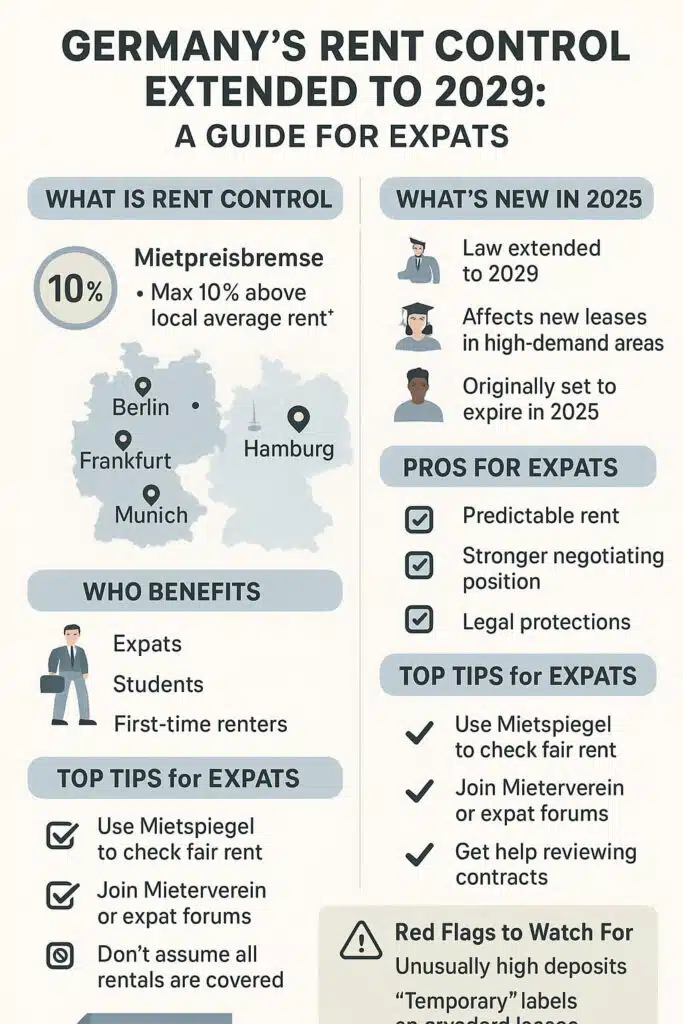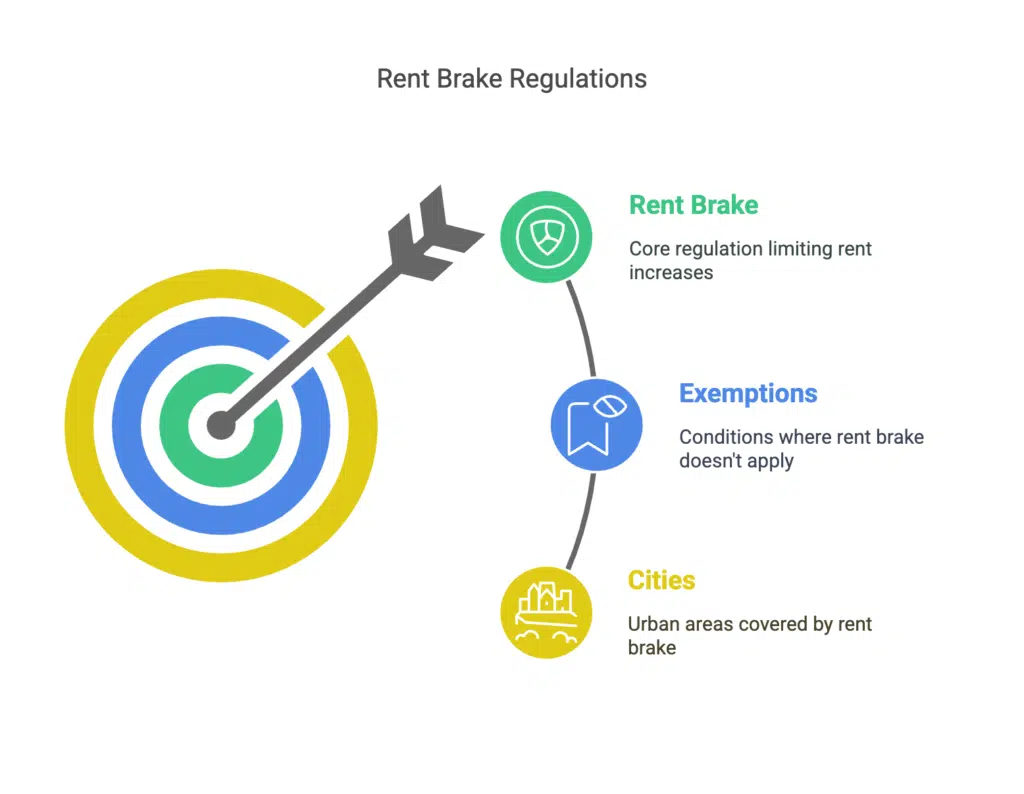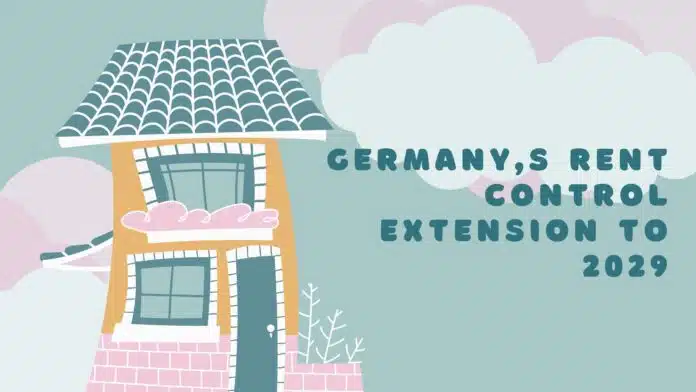If you’ve recently attempted to rent an apartment in cities like Berlin, Hamburg, or Munich, you’re likely aware of how tough it can be. Rent prices are soaring, available listings disappear almost instantly, and attending viewings can feel more like going to a job interview than finding a home. That’s why Germany’s choice to continue its rent control measures until 2029 is significant news, especially for those moving to the country and trying to find a place in this challenging market.
CDU liebt derzeit sozialistische und kommunistische Ideen. Wenig verwunderlich, dass sie die Mietpreisbremse zementieren will.
— Emanuel Boeminghaus (@E_Boeminghaus) April 11, 2025
Wann ist die CDU derart nach Venezuela und Kuba abgebogen?!#Mietpreisbremse #Wohnungsmarkt #Koalitionsvertrag #AvenDATA
Verlängerung statt Lösung:…
Here’s what you need to know about the new extension, how it works, and why it matters for your housing plans in Germany.
What Is Rent Control in Germany?
Rent control in Germany, known as the “Mietpreisbremse” or rent brake, limits how much landlords can increase rent when a new tenant moves in. It’s aimed at keeping housing affordable in areas where demand far outstrips supply.

Under the current rules, landlords in designated high-pressure housing markets can’t raise rents by more than 10% above the local reference rent (Mietspiegel), a benchmark based on average rents in the area. There are exceptions, like newly built homes or fully renovated flats, but most typical rental units fall under this cap.
These rules apply across many parts of Germany, but are especially relevant in cities popular with expats:
- Berlin – where rents have nearly doubled in the past decade
- Hamburg – a fast-growing city with a tight supply
- Munich – one of Germany’s most expensive housing markets
Why Expats Should Care
For expats, the rental market in Germany can feel like a maze. Finding a decent place to live is a significant hurdle, with language barriers, unfamiliar paperwork, and stiff competition.
Immerhin: Eltern, Alleinerziehende und Studis bekommen mehr Geld. Und Mietpreisbremse wie Deutschlandticket bleiben vier Jahre bestehen.
— Maurice Höfgen (@MauriceHoefgen) April 10, 2025
That’s where rent control comes in.
Rent control limits landlords’ charges to help prevent sudden spikes in housing costs. For newcomers, this means more predictable pricing and a better chance at finding long-term, affordable housing, even in sought-after areas.
Rent control also discourages rent gouging, where landlords exploit new tenants by massively inflating prices. While it doesn’t solve the housing shortage, it does offer some relief in a crowded market, and for many expats, that stability is essential when settling into a new life abroad.
Here’s a clear and engaging section to explain the extension and its impact on expats:
Understanding the Rent Control Extension
The Basics of the Extension
Germany’s Mietpreisbremse, or rent brake, has existed since 2015. It was designed to slow rent increases in high-demand areas, where many locals and expats struggle to find affordable housing.
The rule applies when a new rental contract is signed. In affected zones, landlords can’t charge more than 10% above the average rent (Mietspiegel) for comparable properties. While not a complete freeze, it helps keep prices in check.
The law was initially set to expire in 2025. However, in early 2025, the federal government confirmed it would be extended through 2029, a clear signal that Berlin sees housing affordability as a long-term issue.
For renters, this means more years of protection against sharp price jumps when moving into a new home.
Key Details for Expats
Here’s what this extension means if you’re new to Germany or planning to move soon:
- Rent caps are local. Each city has its own Mietspiegel, a reference rent based on neighbourhood averages and property types. The rent brake keeps new rents within 10% of this figure (unless the home is brand new or recently renovated).
- More cities may be added, and the covered areas could expand further. Many large cities and commuter zones, such as Berlin, Hamburg, Munich, Frankfurt, Cologne, and Düsseldorf, are already included.
- The law remains until 2029. The extension gives tenants several years of rental price stability while lawmakers continue developing long-term housing strategies.
This is especially useful for expats when looking for a new lease. You’re less likely to be overcharged just because you’re unfamiliar with the system or the local language.
Perfect, here’s the next section, written with clarity and real-world relevance for expats in Germany:
How It Affects Expats
The Upside for Expats
The rent break offers much-needed peace of mind for many expats, especially those arriving with a limited budget or on a fixed contract.
- Financial predictability: With rent caps tied to the local average, you’re protected from sudden price hikes when starting a new lease. This is a big help if you’re still transitioning into the job market or managing expenses across two countries.
- More fairness at the start: Rent control helps level the playing field. It gives new arrivals a firmer footing, even without deep local knowledge or fluent German. You can check the Mietspiegel and learn roughly what’s fair, giving you leverage during lease negotiations.
- Longer-term planning: Knowing that prices can’t legally soar overnight means more stability as you settle into your new life. It’s one less thing to worry about while adjusting to work, bureaucracy, and a new culture.
The Downsides to Watch For
Of course, rent control isn’t a silver bullet, and expats may face some downsides.
- Fewer listings: Some landlords avoid long-term leases altogether to get around the rent brake. That means fewer regulated flats on the market, especially in popular areas.
- Tougher competition: Regulated apartments attract more interest. If you don’t speak German or have local references, you might lose out to locals or applicants with better paperwork.
- Hidden costs: Some landlords may try to recoup their losses with higher deposits, one-time fees, or pressure to accept furnished flats or short-term contracts, which often fall outside rent control rules.
The takeaway? Rent control is a big help, but it won’t eliminate all the usual expat housing challenges. Still, knowing your rights can make all the difference when navigating Germany’s complex rental scene.
Great! Here’s the next section that puts the rent control extension into broader context, while staying reader-friendly and grounded:
The Bigger Picture: Rent Control in Germany
A Snapshot of Its Origins
Germany’s approach to rent control isn’t new. It has roots in the post-World War II period, when housing shortages were severe and the government stepped in to protect renters.
Over time, this grew into one of Europe’s most tenant-friendly systems, with strong protections against eviction, long notice periods, and laws that limit excessive rent increases. Even today, more than half of German residents, including many middle-class families and professionals, rent their homes.
This tenant-first mindset reflects a broader cultural value in Germany: housing is a social right, not just a private asset. Rent control is among many tools that help keep cities livable and affordable.
What’s Driving the 2029 Extension?
The extension of rent control to 2029 isn’t happening in a vacuum. It directly responds to rising rents, limited housing supply, and growing public frustration, especially in urban areas.
- Urbanisation and immigration have added pressure to the market. Demand has outpaced supply as more people move to cities like Berlin or Frankfurt. This shifting landscape includes expats, students, and new arrivals.
- Tenant groups and social advocates have pushed hard for the extension, arguing that even more people will be priced out of their neighbourhoods without it.
- At the same time, property developers and landlords warn that strict controls discourage new construction and investment. They argue that limiting profits makes financing new housing harder, which worsens the shortage.
This debate isn’t settled. Critics say rent control treats the symptoms, not the cause. Supporters say it buys time and offers fairness until more housing can be built.
Either way, the 2029 extension signals that Germany is committed, for now, to limiting runaway rents. For expats, that means more predictability in a market that’s often anything but predictable.
Here’s a helpful and concise FAQ section designed with expats in mind:
Answering Expat FAQS
Does This Apply to My Apartment?
Maybe, but not always.

Rent control under the Mietpreisbremse applies only in designated high-demand areas and excludes certain types of rentals. To find out if your apartment is covered:
- Check your city: The rent brake applies in most major urban areas, such as Berlin, Hamburg, Munich, Frankfurt, Cologne, etc. You can usually find a list on your local city website.
- Know the cutoffs:
- New builds (constructed after October 2014) are exempt.
- Apartments that underwent major renovations before the current lease may also be excluded.
- Temporary leases, often under 12 months, are typically outside the law’s scope.
If your flat is older and in a regulated area, it probably qualifies. But it’s always worth checking the details.
Can I Challenge My Rent?
Yes, and many renters do.
If you suspect your rent is more than 10% above the local average, you can:
- Look up the Mietspiegel (local rent index) for your neighbourhood. These are available online and show typical rents by building type, age, size, and location.
- Gather your lease info, including monthly rent, the apartment’s condition, and when your contract started.
- Reach out to a tenant association (Mieterverein). They can help review your contract and, if necessary, support you in challenging an unlawful rent.
These services usually cost a small yearly fee, but they’re a wise investment for expats unfamiliar with German rental law.
What About Furnished or Short-Term Rentals?
This is where things get tricky.
Furnished and short-term rentals are often excluded from rent control rules. Landlords may charge higher prices because the lease is “temporary” or includes amenities.
Expats, especially new arrivals or digital nomads, are prime targets for inflated pricing. Be cautious:
- Watch for vague lease terms that say “short stay” or under one year, even if you plan to stay longer.
- Ask for a breakdown of rent versus furniture or utility costs.
- If possible, get a German-speaking friend or advisor to review the lease.
Long-term, unfurnished rentals offer the most protection under the Mietpreisbremse. But if flexibility is key, go in with your eyes open.
Here’s a straightforward, reassuring conclusion to wrap up your article and leave expat readers with actionable takeaways:
Conclusion
What Expats Should Remember: Germany’s decision to extend rent control laws through 2029 is good news for renters, but it’s not unlimited.
The Mietpreisbremse offers protection against unfair rent hikes, especially in cities with sky-high housing demand. But it also means fewer listings, tighter competition, and the need to stay sharp when navigating the rental market.
For expats, the key is to approach the process informed and prepared.
Top Tips for Navigating the Market
- Start with research. Before you move, check which neighbourhoods are rent-controlled using tools like the Mietspiegel or city housing websites.
- Join local networks. Expat Facebook groups, forums, or regional subreddits can offer honest insights and landlord recommendations.
- Get support. A Mieterverein (tenant association) can help you challenge unfair rents. If German isn’t your strong suit, translation services or legal help can protect you from shady contracts.
- Act fast, but read carefully. Good rentals go quickly, but don’t rush into a lease without understanding the fine print.
Renting in Germany isn’t always easy, but with the right tools and local know-how, you can find a fair deal and feel more at home faster.

